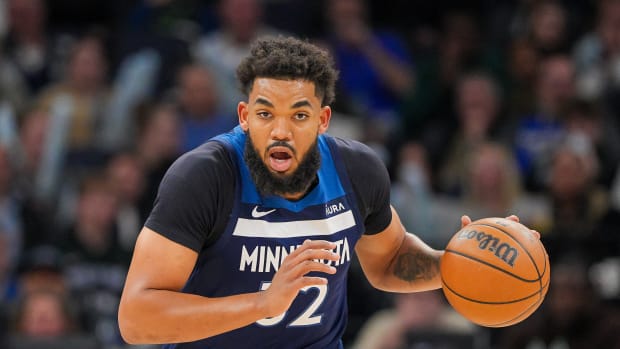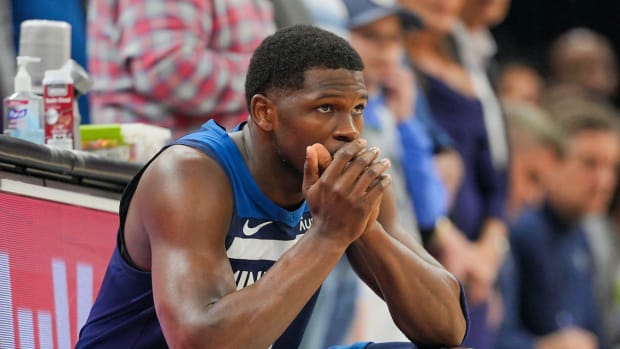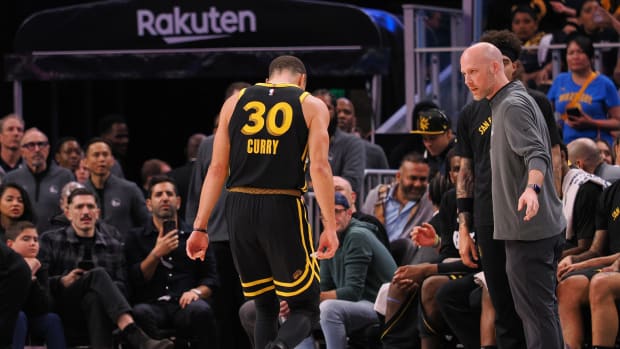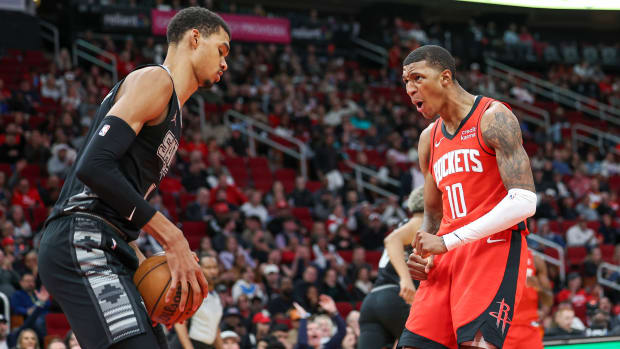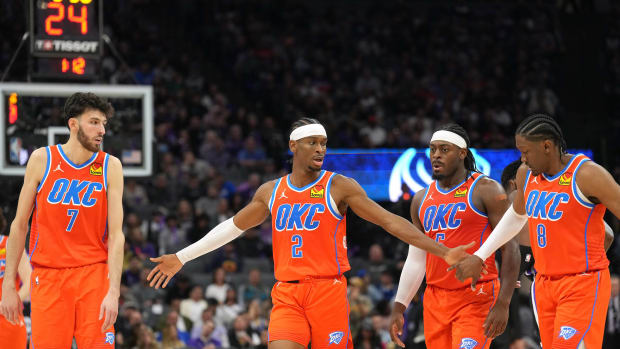The Bismack Biyombo Game: Unsung center carries Raptors over Cavs
Get all of Rob Mahoney’s columns as soon as they’re published. Download the new Sports Illustrated app (iOS or Android) and personalize your experience by following your favorite teams and SI writers.
The single-game dominance of an opportunistic role player is among the NBA’s most glorious playoff traditions. For a night, a bit contributor projects the influence of an outright star. All it takes is the right break, a hot streak, a perfect matchup, or heightened commitment to swing a game and, potentially, a series.
Toronto can only hope for the latter after getting the best game of Bismack Biyombo’s life. The reserve center, who has filled a critical role in the absence of Jonas Valanciunas, posted a team playoff-record 26 rebounds and four blocked shots in the Raptors’ 99–84 Game 3 victory on Saturday. No NBA player has grabbed more rebounds in a playoff game since 1984. Yet Biyombo didn’t seem to approach this game any differently than those that came prior. Every play he made was typical of the Biyombo oeuvre. There were simply more of those plays than ever before, executed in such a way—and with sufficient help— to maximize Biyombo’s efforts.
For starters: Biyombo’s defense at the rim carries more weight when his teammates are able to play some part in the process. Toronto’s perimeter defense in the first two games was so porous as to sabotage any hope of sound rotation. A shot-blocker like Biyombo is already asked to cover more ground than he might feel comfortable as a result of guarding Channing Frye and Kevin Love. That so many Raptors gave up favorable driving angles to their Cavalier counterparts sunk defensive possessions before Biyombo or the other bigs even had a chance to react.
• MORE NBA:LeBron James flops during scuffle | LeBron quotes Jay Z
Cleaning up that perimeter play bought Biyombo time, even if by stalling the offense’s progression for a fraction of a second in each instance. Every beat matters. Force an opponent to double-clutch on his layup attempt and Biyombo might be able to swoop in from behind:
Force a ballhandler into a slightly more rounded drive and Biyombo might make it over in time:
[youtube:https://youtu.be/T0YZsiaSWwg]
Toronto offered enough resistance on the perimeter through targeted switching, going under on certain ball screens, and just staying solid enough in many cases for Biyombo to be present. Give him that much and he’ll make life hell for any opponent intending to score at the rim. Cleveland converted just 46.7% of its shot attempts from the restricted area in Game 3 after shooting 72.4% on such attempts between Games 1 and 2. Forcing those misses created more rebounds, most of which were scrapped for and scooped up by the Raptors. This was Toronto’s best defensive rebounding performance yet and a dramatic improvement on the ridiculous number of offensive rebounds it conceded in Game 1. Biyombo didn’t act alone; Toronto’s best-rebounding stretches were the product of entire lineups boxing out diligently and fighting for available boards.
With that source of offense limited and Cleveland’s uncontested drives held to a minimum, Toronto was able to tide itself over with defense. Even successful possessions by the Cavs were steered and ultimately warded off by several Raptors making consecutive defensive efforts. Enough otherwise good looks were contested, enough openings were discouraged, and enough productive possessions turned up empty for Toronto to win on balance. Even an offense as prolific as this can stumble to inefficiency—in this case because a string of misses pushed the Cavs to desperation. Cleveland shooters, knowing full well how difficult it had been to score at the rim over Toronto’s layered defense, fell into a pattern of hoisting up rushed threes before the offense had fully developed. Patience is an active practice. Any offense that doesn’t exercise it is vulnerable, no matter its firepower.
Toronto doesn’t win this game if not for its team-wide success (on 12-of-31 shooting) from beyond the arc, 32 points (on 24 shots) from an energetic DeMar DeRozan, a quiet 20 points and six rebounds from Kyle Lowry, and heady play from reserves Cory Joseph and Patrick Patterson. Biyombo, though, stole the show by dominating the box score and looming over each defensive possession. The night was made his when Biyombo, one of the most limited offensive players in the league, sparked a Raptors’ 6–0 scoring run to help protect their fourth-quarter lead. That, on Biyombo’s scale, counts as a genuine playoff moment. This was the Bismack Biyombo Game: an occasion worthy of note, no matter its delaying of the inevitable.






























